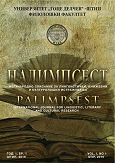ELEMENTARY INTERPRETATION OF THE COSMOS BY PRE-SOCRATICS
DOI:
https://doi.org/10.46763/PALIM24917145kAbstract
It is indisputable fact that the geocentric model in correlation with the stars was the predominant description of the cosmos on which the basic doctrines of ancient civilizations rely. The ancient ideas regarding the motion of the planets, together with all other heavenly bodies in the universe and their impact on the life on Earth, were built on the model of the Sun’s and Moon’s visible effects, for which there was always an opinion that they were correlated with the creation of life. Or as Heraclitus mentions: „If there were no sun, all the other stars together could not dispel the night “(Plut., Аquane an ignis utillior 957a: De fortuna 98c). The key role in reconstruction of the models of the cosmos in Ancient Greece is attributed to the Babylonian data on astrology and astronomy. The interest in astronomy on the territory of ancient Greece emerged as a result of pre-Socratics in the 6th century BCE who begun the rejection of mythological details about the world and humans as well as the deviation from the theories about the creator deity and the supernatural divine forces. The pre-Socratics sought to understand the various aspects of nature offering explanations that could be deemed as scientific by posing fundamental question about the origin and the substance of the world, and not by providing answers to questions like who created or how the world was created. The search for answers whether the world, as known so far, is in a state of world-order (Cosmos) or disorder (Chaos) provides the basic intention in their philosophical conception of a universe governed by laws.
Keywords: Cosmos; astrology; pre-Socratics; Pythagoras; Heraclitus.


